Massachusetts is a state known for its rich history, stunning scenery, and vibrant culture. From the picturesque rolling hills of the Berkshire Mountains to the rugged coastline of Cape Cod, there is no shortage of natural beauty to explore.
For those seeking a unique and immersive outdoor experience, backpacking in Massachusetts is the perfect way to discover the state’s rich history and natural wonders.
Contents
Backpacking in Massachusetts is a wonderful way to step back in time and explore the state’s history and culture.
Many of the state’s trails follow historic routes used by Native Americans and colonists, showcasing sites that played a significant role in shaping American history.
Backpackers can also explore the state’s many forests and parks, which offer diverse terrain and ecosystems to discover.
Whether you are a beginner or an experienced backpacker, Massachusetts has something to offer everyone.
With over 800 miles of trails, including the famous New England Trail, backpackers can explore a variety of terrains and landscapes, from rocky summits to lush forests and serene lakes.
If you love the great outdoors and history, then backpacking in Massachusetts is the perfect way to combine your passions.
From learning about the state’s rich history to exploring its natural beauty, there is no better way to experience the Bay State.
Key Takeaways:
- Backpacking in Massachusetts offers a unique way to explore the state’s rich history and stunning natural beauty.
- The state’s diverse trails and landscapes cater to everyone, from beginners to experienced backpackers.
- Massachusetts boasts over 800 miles of trails, including the famous New England Trail.
- Backpacking in Massachusetts allows you to step back in time and explore the sites that played a significant part in shaping American history.
- Massachusetts is the perfect destination for outdoor enthusiasts who love history and nature.
Massachusetts: A Backpacker’s Paradise
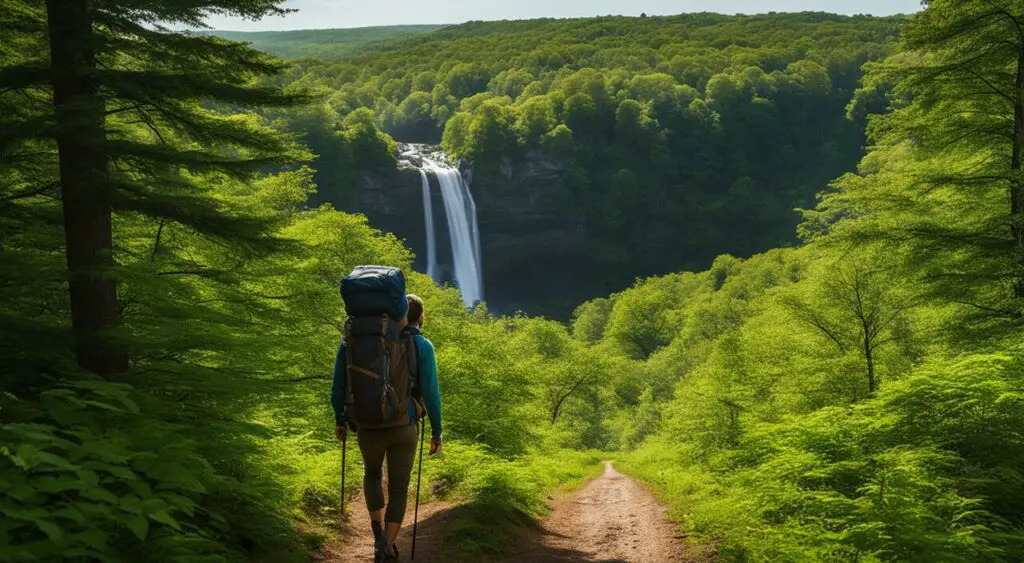
Massachusetts is a unique and exciting backpacking destination for hikers of all levels. With its blend of natural beauty and historical significance.
The Bay State offers a diverse range of trails that showcase its stunning, pristine landscapes and rich cultural heritage.
One of Massachusetts’ most famous backpacking trails is the New England Trail, a 215-mile hiking trail that winds through the state’s stunning forests and mountains.
This trail, which begins in Long Island Sound and ends at the Massachusetts/New Hampshire border, is a favorite among hikers looking for a challenging and scenic adventure.
But the New England Trail isn’t the only backpacking trail in Massachusetts.
The state has an abundance of trails that cater to all skill levels, from beginner to advanced. Some of the most popular backpacking trails in Massachusetts include:
| Trail Name | Location | Length |
|---|---|---|
| Beartown State Forest Trail | Berkshires | 12 miles |
| Mount Greylock Trail | Berkshires | 11 miles |
| Wapack Trail | Northwest corner of the state | 21.5 miles |
These backpacking trails offer a variety of terrains, from lush forests to rugged mountain ridges.
Hikers can enjoy breathtaking views of the state’s natural beauty, including crystal-clear lakes, cascading waterfalls, and towering peaks.
Whether you’re a seasoned hiker or new to backpacking, Massachusetts has something to offer everyone. So pack your bags and hit the trails to discover the beauty and history of the Bay State.
Exploring Massachusetts: Top Backpacking Trails
Massachusetts offers a variety of backpacking trails that cater to hikers of different levels of experience.
From easy trails suitable for novices to strenuous routes that challenge even the most experienced backpackers, the Bay State has it all. Some of the top backpacking trails in Massachusetts include:
Beartown State Forest
Located in the southern Berkshire Mountains, Beartown State Forest boasts over 12,000 acres of unspoiled natural beauty.
The forest is home to numerous hiking trails that span over 20 miles and offer stunning scenic vistas.
Backpackers can explore the dense forest, tranquil streams, and serene ponds that make up this beautiful state forest.
Mount Greylock State Reservation
Mount Greylock, the highest peak in Massachusetts, offers a challenging hike for experienced backpackers.
The trail to the summit is over 11 miles long and features steep inclines and rocky terrain. However, the scenic views of the surrounding Berkshires are worth the effort.
Additionally, the state reservation offers several other trails for backpackers of different levels of experience.
Mount Wachusett
Located in central Massachusetts, Mount Wachusett is a popular hiking destination for locals and visitors alike.
The mountain offers several trails that range in difficulty from easy to strenuous.
The summit provides breathtaking panoramic views of the surrounding countryside, making it a must-visit destination for backpackers.
Blue Hills Reservation
The Blue Hills Reservation, located just outside of Boston, is a popular destination for backpackers looking for a convenient day trip.
The reservation offers over 100 miles of trails that cater to hikers of different levels of experience. Backpackers can explore the shady forests and rocky terrain while enjoying stunning views of the Boston skyline.
Myles Standish State Forest
Myles Standish State Forest, located in southeastern Massachusetts, offers over 35 miles of hiking trails that wind through lush forests and tranquil ponds.
The forest is home to a variety of wildlife, including white-tailed deer, wild turkeys, and red-tailed hawks.
Backpackers can enjoy the peaceful surroundings while exploring the diverse terrain of this beautiful state forest. These are just a few of the top backpacking trails in Massachusetts.
With over 1,500 miles of hiking trails, the Bay State offers endless opportunities for outdoor enthusiasts to explore its natural beauty.
Planning Your Backpacking Adventure

Before embarking on a backpacking trip in Massachusetts, it is essential to plan accordingly.
This includes using maps and driving directions to ensure that you arrive at your desired location safely and efficiently.
It is also important to research camping options and obtain any necessary permits.
The Appalachian Trail is a popular backpacking destination in Massachusetts, spanning over 90 miles through the state’s western region.
Hikers can enjoy stunning views of the Berkshires and the Housatonic River Valley along the way.
Additionally, there are several state forests and parks that offer backpacking trails, including Beartown State Forest and Mount Greylock.
Maps and Driving Directions
When planning a backpacking trip in Massachusetts, utilizing trail maps and driving directions can make all the difference.
The Massachusetts Department of Conservation and Recreation provides a comprehensive list of maps for state parks and forests, including downloadable versions for easy access.
Additionally, GPS or smartphone apps can be used to navigate hiking trails and locate campsites.
It is important to note that some trailheads may be located in remote areas without easy access to the main road.
As such, it is recommended to check the weather and plan accordingly, including ensuring that your vehicle is equipped for off-road conditions.
Camping
Camping is an integral part of backpacking, and Massachusetts offers a range of camping options for hikers.
There are several campsites located along the Appalachian Trail, including the Upper Goose Pond Cabin, which offers bunk beds and a wood-burning stove for chilly nights.
Additionally, there are campgrounds located within state parks and forests, such as Laurel Ridge State Park and October Mountain State Forest.
It is important to research camping options and regulations beforehand, as some campsites may require reservations or have limited availability.
It is also crucial to adhere to all fire regulations and pack out all trash to preserve the natural beauty of the area.
Outdoor Adventures
While backpacking is a popular outdoor adventure in Massachusetts, there are also plenty of other options for nature enthusiasts.
The state is home to numerous lakes and rivers, offering opportunities for kayaking, canoeing, and fishing.
Additionally, there are several mountain biking and rock climbing destinations, such as the Berkshire East Mountain Resort and the Quincy Quarries.
Overall, Massachusetts offers a diverse range of outdoor adventures for backpackers and nature enthusiasts alike.
By properly planning and preparing for your trip, you can have a safe and enjoyable experience in the beautiful Bay State.
Backpacking Gear and Essentials
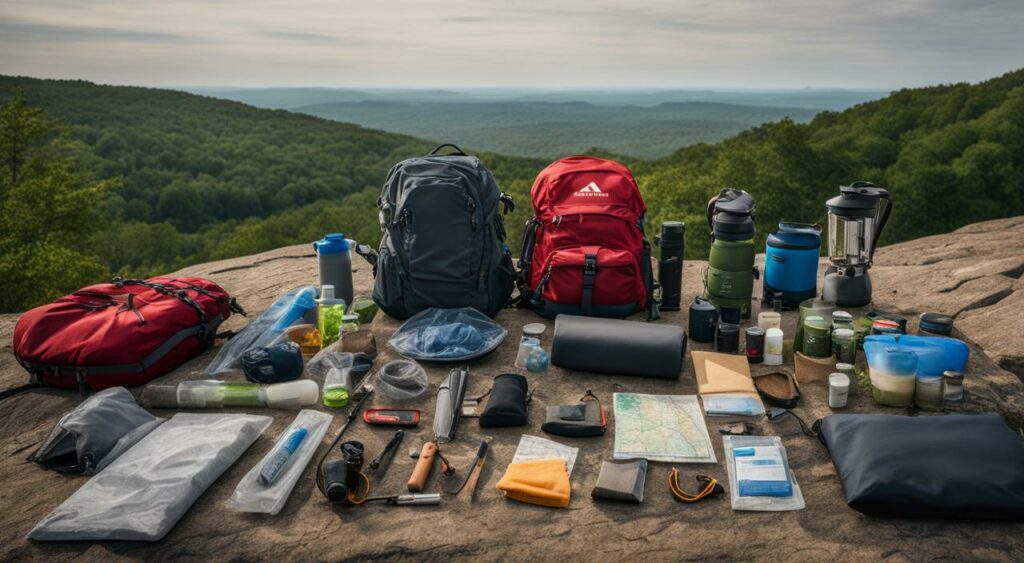
When preparing for a backpacking trip in Massachusetts, it’s crucial to have the right gear and essentials to ensure a safe and comfortable experience.
Proper backpacking equipment can make a significant difference when traversing the varied terrain of the Bay State’s hiking trails. Here are some backpacking gear and essentials to consider:
Backpack
The backpack is an essential piece of gear for backpacking in Massachusetts.
It would be best to find a backpack that fits comfortably and has adjustable straps to help distribute the weight of the pack evenly.
Look for backpacks with a capacity of at least 50 liters or more, depending on your trip duration.
Tent
A tent is essential for overnight backpacking trips in Massachusetts. It is best to choose a lightweight and sturdy tent that can withstand varying weather conditions.
Look for tents with a waterproof rainfly and sufficient ventilation to keep you comfortable during the night.
Sleeping Bag and Pad
A sleeping bag and pad are crucial for providing warmth and comfort while camping in Massachusetts.
Choose a sleeping bag that is appropriate for the weather conditions, and be sure to select a sleeping pad that fits your needs and provides ample cushioning for a good night’s rest.
Water Filtration System
The availability of clean water is essential for backpacking. It’s recommended to bring a portable water filtration system, which can effectively filter out impurities from various water sources.
Having a water filtration system will allow you to access and consume fresh water from natural sources without worrying about contamination.
Navigation Tools
Having a map and compass is crucial for navigating the trails of Massachusetts effectively. These tools can help hikers stay on course and avoid getting lost.
It’s also recommended to bring a GPS device or a smartphone with GPS capabilities to track your location and plan your route.
Other Essentials
Other backpacking essentials include first aid kit, headlamp or flashlight, fire starter kit, and multi-tool or knife. It’s also advisable to bring appropriate clothing and footwear for varying weather conditions and terrain.
Remember that carrying extra weight on your backpack can significantly impact your experience. Plan carefully and pack thoughtfully to ensure a comfortable and enjoyable backpacking trip in Massachusetts.
Massachusetts Wilderness: Camping and Outdoor Adventures
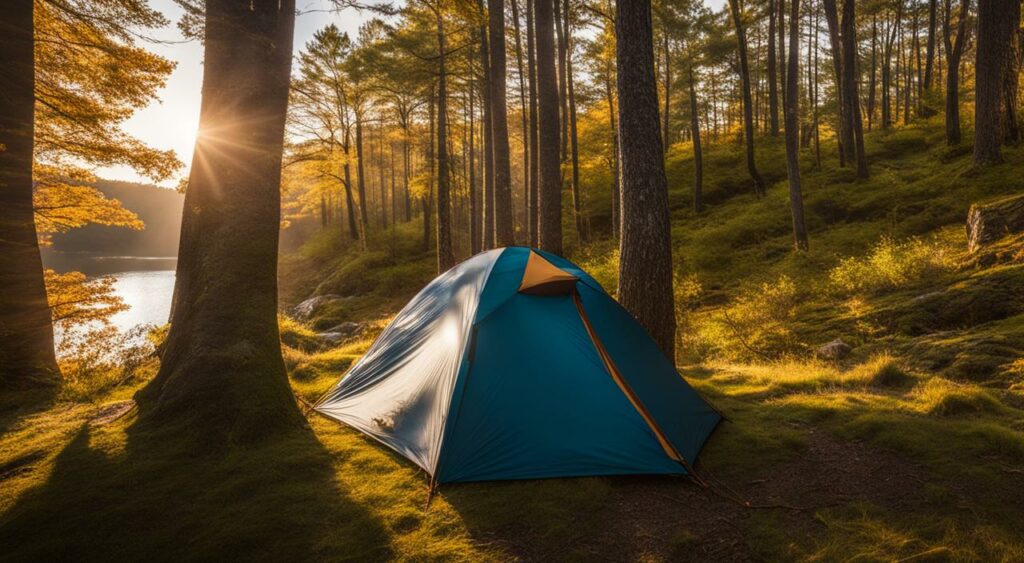
Massachusetts is not only known for its rich history and bustling cities but also for its stunning wilderness areas that offer unforgettable outdoor experiences.
Camping in Massachusetts is a popular activity for nature lovers, and the state offers a wide variety of options for those seeking to explore the great outdoors.
From serene forests to pristine lakeshores, Massachusetts has something to offer for every type of camper. The state’s wilderness areas are perfect for hiking, fishing, boating, and wildlife watching.
Here are some of the top camping spots and outdoor adventures in Massachusetts:
| Camping Spot | Location | Highlights |
|---|---|---|
| Berkshire East Camping | Charlemont | Zip-lining, white water rafting, mountain biking, hiking |
| Wompatuck State Park | Hingham | Mountain biking, hiking, fishing, camping, canoeing |
| Fowler Beach | Wellfleet | Oceanfront camping, beachcombing, fishing |
These are just a few examples of the many camping spots available in Massachusetts.
Outdoor adventurers can also explore the state’s many parks and forests, including Mohawk Trail State Forest, the Quabbin Reservoir, and the Blue Hills Reservation.
There are ample opportunities for hiking in Massachusetts as well.
The state offers a wide range of hiking trails suitable for all skill levels, from the easy Purgatory Chasm trail to the challenging Tully Trail.
Many trails are located in state forests and parks, including the Mohawk Trail State Forest and Mount Greylock State Reservation.
For those seeking a more unique outdoor experience, Massachusetts also offers whale watching tours, zip-lining, and hot air balloon rides.
These activities allow visitors to experience the state’s natural beauty in a completely different way. Overall, Massachusetts is a paradise for outdoor enthusiasts and campers.
Whether visitors are seeking a peaceful retreat surrounded by nature or a thrilling adventure, the state’s wilderness areas offer something for everyone.
Best Backpacking Routes in Massachusetts
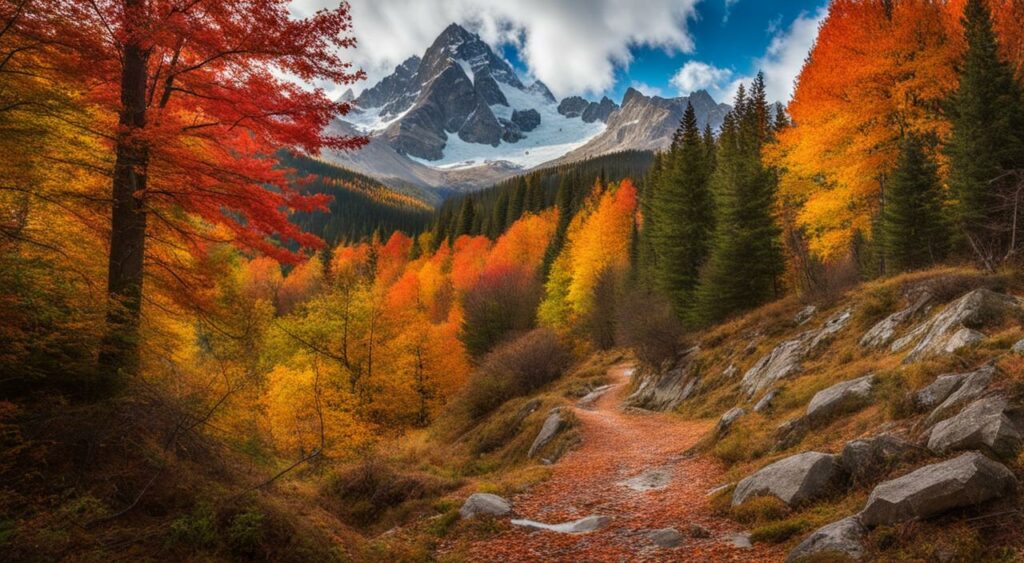
Embarking on a backpacking trip in Massachusetts promises to be a breathtaking and adventurous experience.
With an extensive network of hiking trails and stunning natural landscapes, the state offers numerous opportunities for backpackers to explore.
Here are some of the best backpacking routes in Massachusetts:
Berkshire Loop Trail
The Berkshire Loop Trail is a 12-mile trail that offers stunning views of the Berkshire Mountains and the nearby towns.
The trail is known for its well-maintained paths and relatively easy terrain, making it an ideal option for those who want to enjoy scenic beauty without pushing themselves too hard.
The trail has several campsites and shelters, allowing backpackers to camp overnight while enjoying the starry nights.
Mount Greylock Summit Loop
Mount Greylock, standing 3,491 feet high, is the highest peak in Massachusetts.
The Mount Greylock Summit Loop trail is an 11.5-mile hike that leads backpackers through the state’s highest mountain, offering panoramic views of the surrounding valleys and hills.
This trail is rated as challenging, making it better suited for experienced backpackers.
The summit has a lodge where backpackers can rest and grab some food before proceeding with their trek.
Pioneer Valley Ramble
The Pioneer Valley Ramble is a 100-mile trail that runs from the Massachusetts-New Hampshire border in the north to the Connecticut border in the south.
This trail passes through the Connecticut River Valley, taking backpackers through several small towns, farmlands, and forests.
The trail offers a range of terrains, from rocky hills to flat meadows, making it a diverse option for backpackers.
This trail does not have shelters, so backpackers need to carry their tents and supplies for a camping experience.
Midstate Trail
The Midstate Trail is a 92-mile trail that runs from the Rhode Island border in the south to the New Hampshire border in the north.
The trail passes through central Massachusetts, offering backpackers stunning views of the state’s natural beauty.
The trail is rated as challenging, with steep elevations in some sections. The trail has several campsites and shelters, allowing backpackers to spend the night while exploring.
Backpacking in Massachusetts offers a range of opportunities to explore the state’s natural beauty.
The trails mentioned above are just a few of the many backpacking routes available for hikers to choose from.
Whether you are a seasoned backpacker or someone looking to embark on their first hiking adventure, Massachusetts has something for everyone.
Safety Tips and Considerations for Backpacking in Massachusetts
Backpacking in Massachusetts can be an exhilarating experience for nature enthusiasts, but it’s essential to take the necessary precautions to ensure a safe trip.
The following tips and considerations will help hikers prepare for their backpacking adventure in the Bay State.
Backpacking Safety Tips in Massachusetts
When venturing out into the wilderness, it’s crucial to stay safe and aware of your surroundings. Here are some backpacking safety tips for Massachusetts:
- Always carry a first aid kit and know how to use it
- Stay hydrated by drinking plenty of water
- Wear appropriate clothing and footwear for the terrain and weather
- Protect yourself from the sun with sunscreen and a hat
- Avoid hiking alone and let someone know your plans and expected return time
- Keep a safe distance from wildlife and never feed them
- Carry bear spray and know how to use it
- Be mindful of the location of emergency services and carry a fully charged phone
Backpacking Permits in Massachusetts
Obtaining backpacking permits is an important consideration when planning a trip in Massachusetts.
Backpackers should research the specific regulations and requirements for the area they plan to hike in and obtain all necessary permits before embarking on their trip.
Failure to obtain permits can result in fines and other penalties.
The Massachusetts Department of Conservation and Recreation is a helpful resource for obtaining permits and information about backpacking regulations in the state.
Outdoor Adventure Beyond Backpacking: Road Trips and Exploration
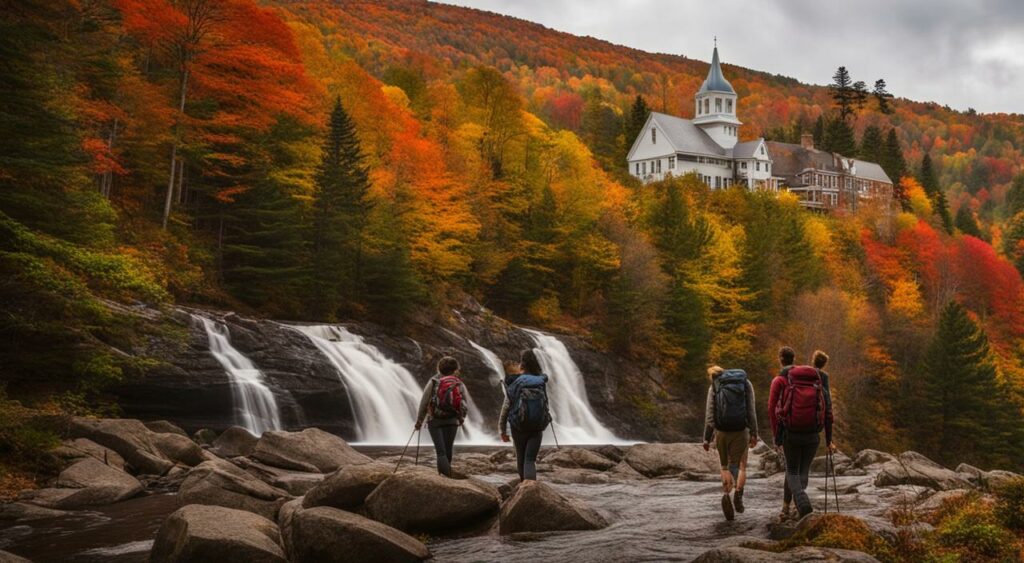
Massachusetts offers more than just backpacking trails and camping spots. The state is filled with opportunities for outdoor adventure, from scenic road trips to exploring nature up close.
One of the best ways to take in the stunning landscapes of Massachusetts is by hitting the road. The Mohawk Trail is a scenic drive that takes you through the Berkshire Mountains and historic towns.
Another option is the Coastal Scenic Byway, which offers breathtaking views of the Atlantic Ocean and charming seaside towns.
For those seeking to explore nature up close, Massachusetts offers a wide range of outdoor activities.
From kayaking on the Charles River to whale watching off the coast of Cape Cod, there is no shortage of exciting experiences to be had.
Birdwatching enthusiasts will love the Great Marsh Birdwatching Trail, while those looking for a more challenging hike can take on the Seven Sisters Trail in the Holyoke Range.
The state’s many parks and forests also offer opportunities for mountain biking, fishing, and rock climbing.
The Allure of Massachusetts: Off the Beaten Path Backpacking
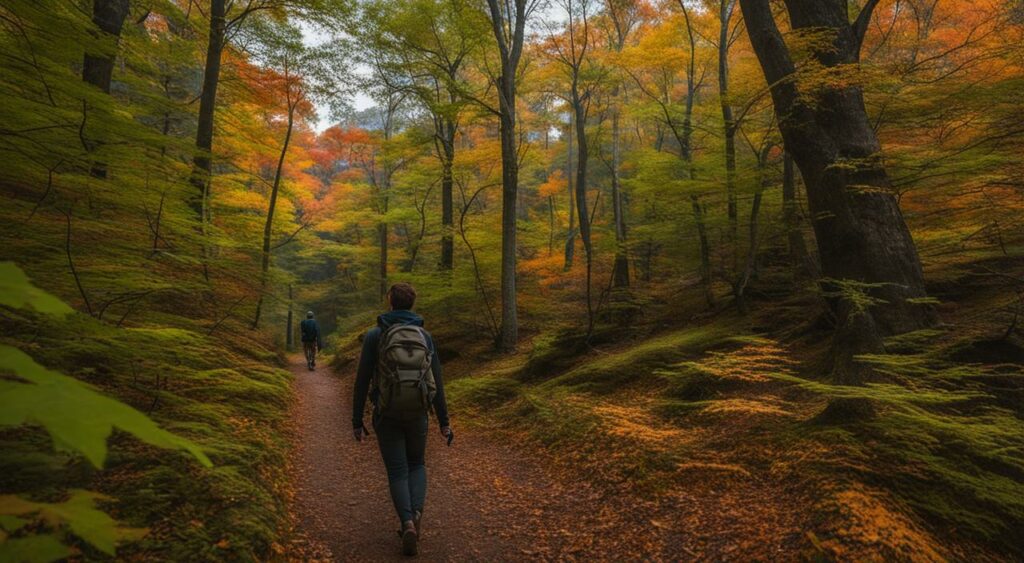
While Massachusetts offers a wealth of popular backpacking routes, some travelers may prefer to venture off the beaten path and explore lesser-known destinations.
These hidden gems offer a unique opportunity for adventurous backpackers to discover the unspoiled wilderness areas of Massachusetts.
Unique Experiences
Off the beaten path backpacking in Massachusetts allows hikers to escape the crowds and connect with nature in a more intimate way.
Explore the serene and secluded landscapes of Myles Standish State Forest, where you’ll encounter diverse wildlife and picturesque ponds.
Or, discover the rugged beauty of Cutler Coast Public Lands, a remote coastal wilderness area with stunning ocean views and unspoiled beaches.
Hidden Destinations
There are many hidden destinations for backpacking in Massachusetts that are often overlooked by tourists.
These include the Mohawk Trail State Forest, which offers stunning views of the Berkshire Mountains and numerous hiking trails.
Additionally, the Wapack Trail is a lesser-known route that spans over 21 miles and crosses the state border into New Hampshire.
Tips for Off the Beaten Path Backpacking
- Research the area beforehand and be prepared for any unique challenges or obstacles that may arise.
- Ensure you have the proper gear and equipment for the terrain you’ll be hiking on.
- Bring a map and compass, as some off the beaten path backpacking routes may not be well-marked.
- Obtain any necessary permits and adhere to safety guidelines.
Off the beaten path backpacking in Massachusetts is the perfect choice for adventurous backpackers looking to explore beyond the popular trails.
These hidden destinations offer a unique experience and a chance to connect with nature on a deeper level.
Massachusetts Backpacking Guide: Tips and Resources
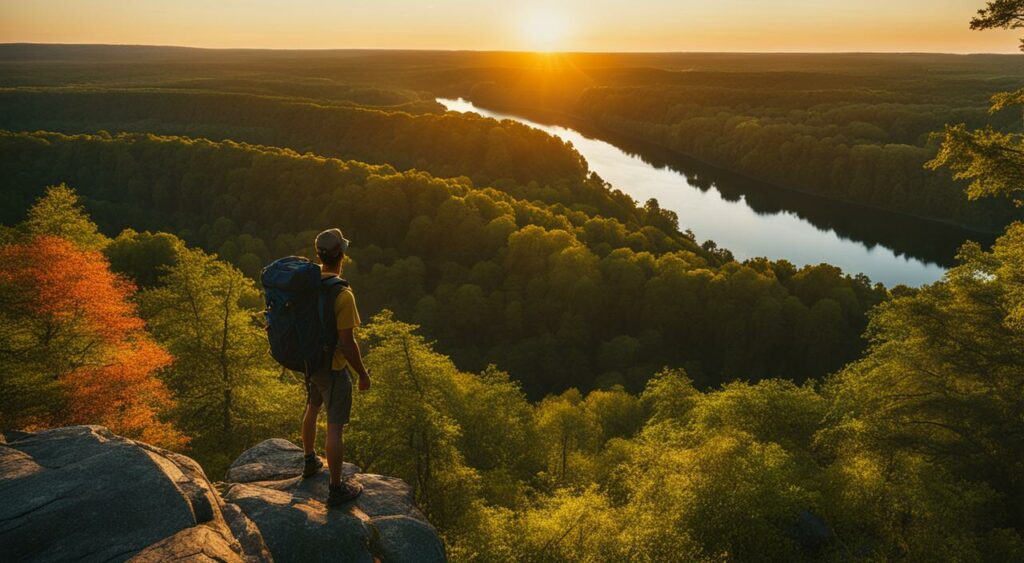
Embarking on a backpacking adventure in Massachusetts requires preparation and planning. Here are some tips and resources to help ensure a successful trip:
Massachusetts Backpacking Trails
Massachusetts is home to a variety of backpacking trails, each with its unique features and challenges.
The famous Appalachian Trail runs through the western part of the state, while the New England Trail offers a 215-mile adventure through the eastern half of the state.
Other noteworthy trails include:
| Trail Name | Trail Features |
|---|---|
| Mount Greylock State Reservation | Beautiful views of the surrounding mountains and valleys |
| Beartown State Forest | Scenic waterfalls and serene forests |
| Cape Cod National Seashore | Stunning beaches and coastal landscapes |
Before hitting the trails, it’s important to research trail conditions and difficulty levels to ensure that the chosen trail is appropriate for the backpacker’s skill level.
Backpacking Tips for Massachusetts
Here are some backpacking tips to keep in mind when exploring Massachusetts:
- Obtain necessary permits and follow safety guidelines: Some backpacking areas in Massachusetts require permits, and it’s essential to follow safety guidelines to ensure a safe and enjoyable experience.
- Dress appropriately: Be prepared for varying weather conditions as Massachusetts can experience extremes, with hot and humid summers, and cold, snowy winters.
- Pack essential items: Proper gear and equipment are crucial for a successful backpacking trip. Some essential items to pack include a first aid kit, map, compass, and plenty of water and food.
- Leave no trace: It is crucial to maintain the natural beauty of Massachusetts by leaving no trace of human activity. This includes packing out all trash and avoiding damaging plants and wildlife.
Massachusetts Backpacking Guide
The Massachusetts Department of Conservation and Recreation provides a comprehensive backpacking guide that includes information on all the backpacking trails in the state, permit requirements, and safety guidelines, among other things.
The guide can be found on the Massachusetts state website.
Another useful resource is the AMC (Appalachian Mountain Club), which provides a guide to hiking and backpacking in Massachusetts.
The AMC is a nonprofit organization dedicated to promoting the protection, enjoyment, and understanding of the mountains, forests, waters, and trails of the Appalachian region.
Backpacking in Massachusetts is an excellent way to explore the state’s history and natural beauty.
By following the tips and resources provided, hikers can ensure a safe and enjoyable experience on Massachusetts’s backpacking trails.

Conclusion
Backpacking in Massachusetts offers a unique combination of history and natural beauty that is hard to match.
With diverse trails, serene wilderness areas, and endless outdoor activities, the Bay State is a backpacker’s paradise.
Whether you are a seasoned hiker looking for a challenge or a beginner looking for a taste of the outdoors, Massachusetts has something to offer.
From the famous New England Trail to off the beaten path destinations, there is no shortage of backpacking routes to explore.
Planning a successful backpacking trip in Massachusetts requires careful preparation, including obtaining necessary permits, packing essential gear, and following safety guidelines.
However, the payoff is worth it – a chance to immerse yourself in the stunning natural landscapes and fascinating history that Massachusetts has to offer.
So, pack your bags, pick a trail, and get ready for an unforgettable backpacking adventure in the Bay State.

FAQ
-
What makes Massachusetts a great destination for backpacking?
Massachusetts offers a blend of history and natural beauty, making it an ideal destination for backpacking. From historic trails to scenic vistas, the Bay State has something for every outdoor enthusiast.
-
What are some of the top backpacking trails in Massachusetts?
Some of the top backpacking trails in Massachusetts include Beartown State Forest, Mount Greylock, and the famous New England Trail. These trails offer a variety of terrains and stunning views.
-
How should I plan my backpacking adventure in Massachusetts?
Planning your backpacking adventure in Massachusetts involves using trail maps and driving directions, as well as considering camping options and other outdoor adventures available in the state.
-
What gear and essentials do I need for backpacking in Massachusetts?
Essential gear and equipment for backpacking in Massachusetts include appropriate backpacks, camping gear, proper footwear, and essential items such as water, food, and navigation tools.
-
Where can I find camping spots and outdoor adventures in Massachusetts?
Massachusetts offers wilderness areas with camping spots and opportunities for various outdoor adventures. These serene and unspoiled landscapes are perfect for nature lovers.
-
What are some of the best backpacking routes in Massachusetts?
Some of the best backpacking routes in Massachusetts include a variety of trails with unique features. Each route offers different difficulty levels and highlights for hikers to enjoy.
-
What safety tips and considerations should I be aware of for backpacking in Massachusetts?
When backpacking in Massachusetts, it is crucial to follow safety guidelines and obtain necessary permits. Being prepared and aware of potential risks can ensure a safe and enjoyable trip.
-
What other outdoor adventures can I enjoy in Massachusetts beyond backpacking?
In addition to backpacking, Massachusetts offers opportunities for road trips and exploration. You can discover the state’s diverse outdoor activities, including exploring nature and indulging in various outdoor adventures.
-
Are there any off the beaten path backpacking destinations in Massachusetts?
Yes, Massachusetts has hidden gems and lesser-known backpacking destinations that appeal to adventurous hikers. Exploring these off the beaten path locations can offer a unique and exciting experience.
-
Where can I find a comprehensive backpacking guide and resources for Massachusetts?
A comprehensive backpacking guide and resources for Massachusetts can provide useful tips and information for planning a successful trip. It includes information on popular trails and offers valuable advice for backpackers.

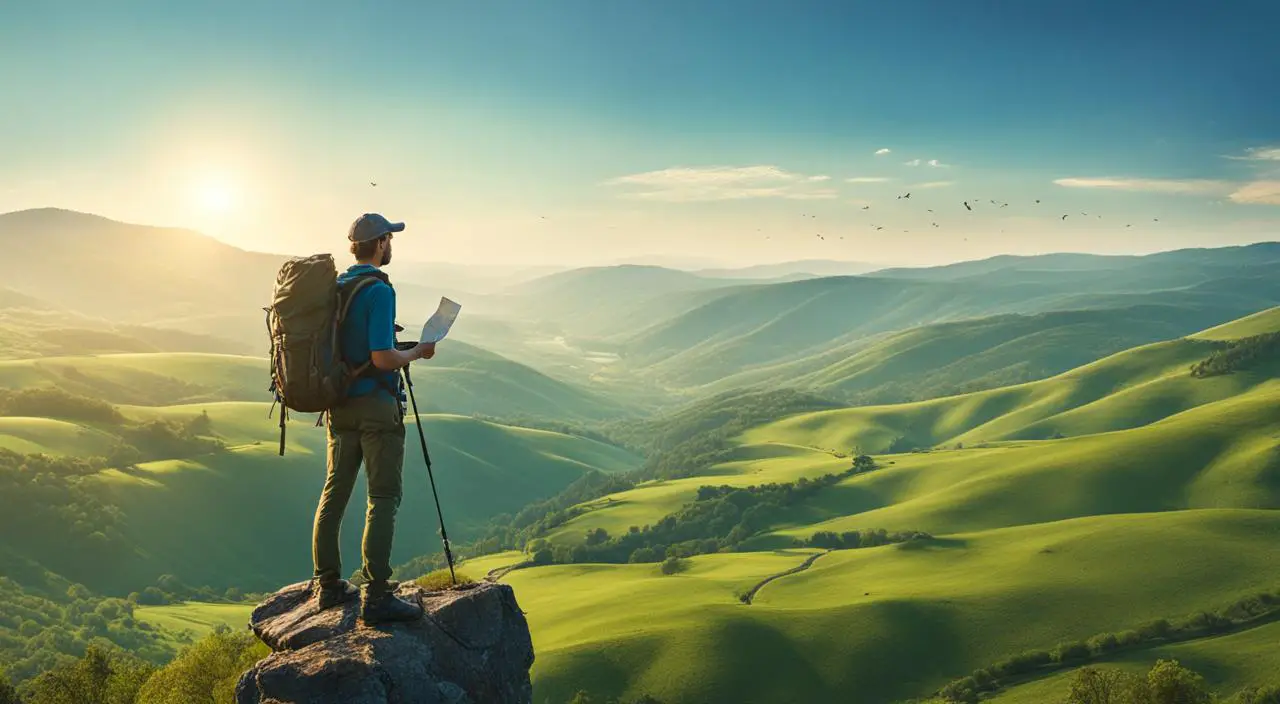







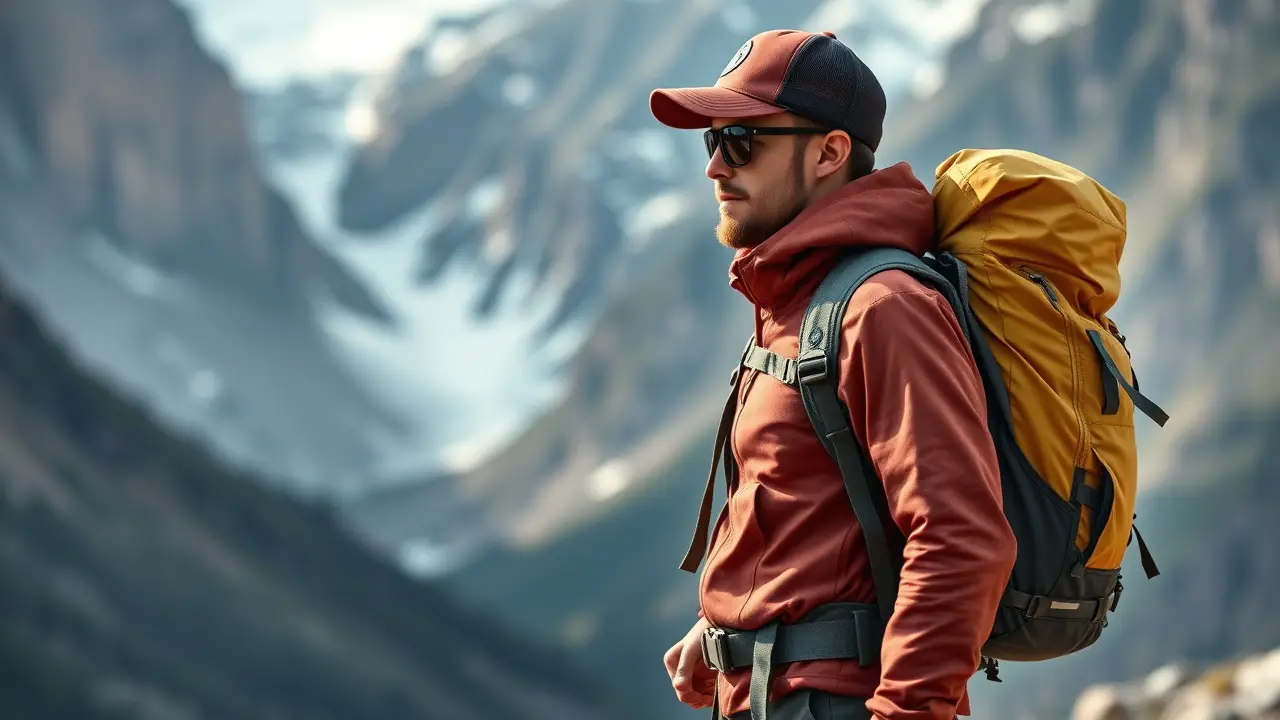
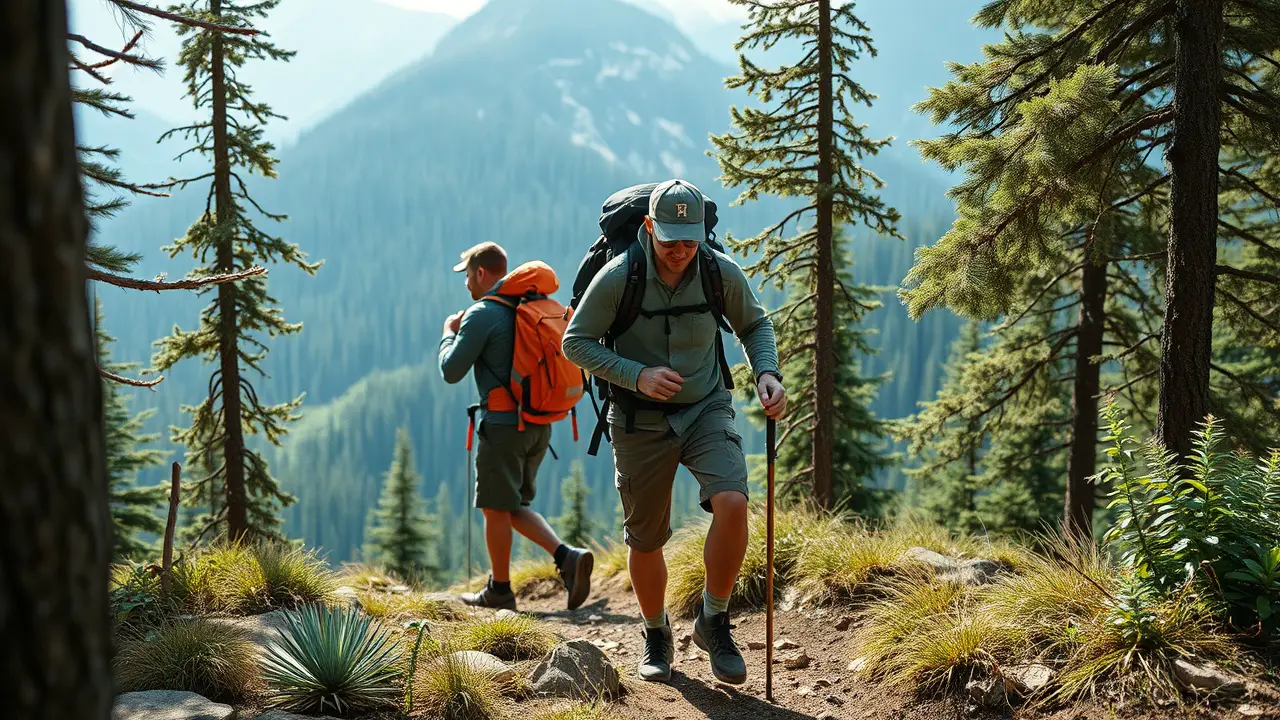
Leave a Reply